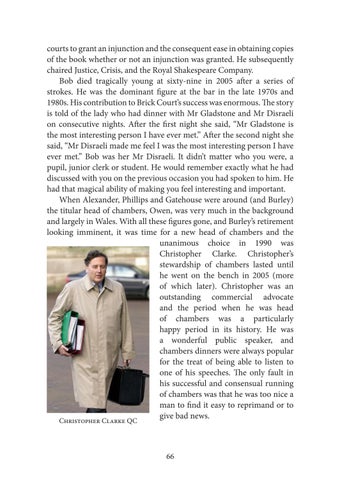courts to grant an injunction and the consequent ease in obtaining copies of the book whether or not an injunction was granted. He subsequently chaired Justice, Crisis, and the Royal Shakespeare Company. Bob died tragically young at sixty-nine in 2005 after a series of strokes. He was the dominant figure at the bar in the late 1970s and 1980s. His contribution to Brick Court’s success was enormous. The story is told of the lady who had dinner with Mr Gladstone and Mr Disraeli on consecutive nights. After the first night she said, “Mr Gladstone is the most interesting person I have ever met.” After the second night she said, “Mr Disraeli made me feel I was the most interesting person I have ever met.” Bob was her Mr Disraeli. It didn’t matter who you were, a pupil, junior clerk or student. He would remember exactly what he had discussed with you on the previous occasion you had spoken to him. He had that magical ability of making you feel interesting and important. When Alexander, Phillips and Gatehouse were around (and Burley) the titular head of chambers, Owen, was very much in the background and largely in Wales. With all these figures gone, and Burley’s retirement looking imminent, it was time for a new head of chambers and the unanimous choice in 1990 was Christopher Clarke. Christopher’s stewardship of chambers lasted until he went on the bench in 2005 (more of which later). Christopher was an outstanding commercial advocate and the period when he was head of chambers was a particularly happy period in its history. He was a wonderful public speaker, and chambers dinners were always popular for the treat of being able to listen to one of his speeches. The only fault in his successful and consensual running of chambers was that he was too nice a man to find it easy to reprimand or to give bad news. Christopher Clarke QC
66














